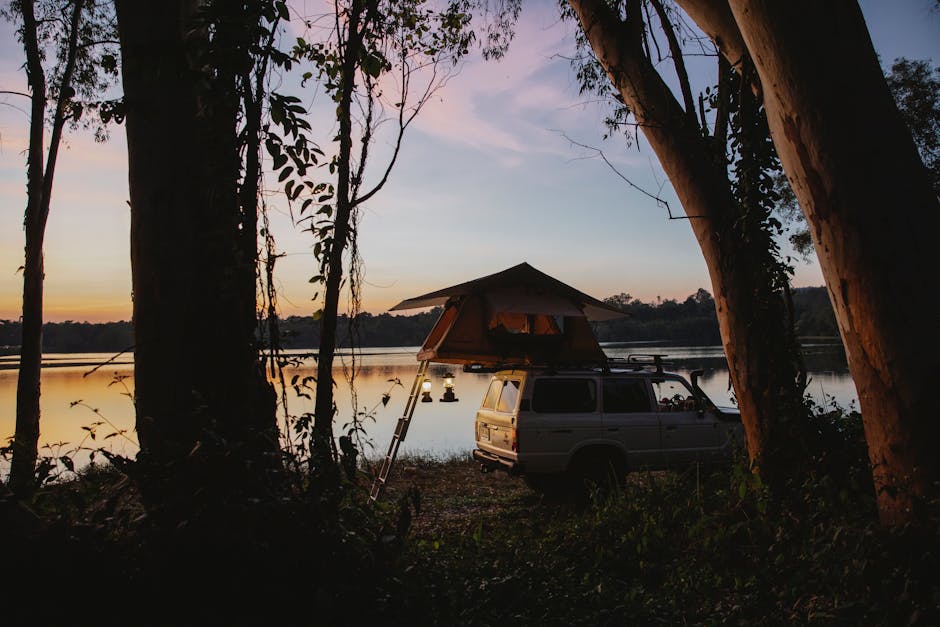Best small SUV to sleep in: Cozy Freedom 2025
Why Small SUVs Are Perfect for Car Camping Trips
The best small suv to sleep in combines everyday practicality with weekend trip potential. These vehicles offer a great balance of fuel efficiency, daily usability, and enough space to transform into a mobile bedroom for your getaways.
Top Small SUVs for Sleeping:
- Subaru Forester – 74.2 cu. ft. cargo space with standard AWD
- Honda CR-V – Flat-folding seats and excellent reliability
- Toyota RAV4 – 69.8 cu. ft. space with hybrid options available
- Subaru Crosstrek – 55.3 cu. ft. space, most fuel-efficient option
- Mazda CX-50 – 56.3 cu. ft. space with premium interior features
As car camping’s popularity soars, a vehicle that can double as a campsite is more valuable than ever. Small SUVs are ideal because they offer key advantages over other vehicles: ample cargo space (55-75 cubic feet), excellent fuel economy (25+ MPG), and the maneuverability to reach spots big rigs can’t.
Unlike sedans, they provide the ground clearance and available all-wheel drive to reach remote locations. Unlike converted vans, they offer a degree of stealth for camping in less obvious areas. The key to comfort is finding a model with flat-folding rear seats, which create a level sleeping surface long enough for most adults.
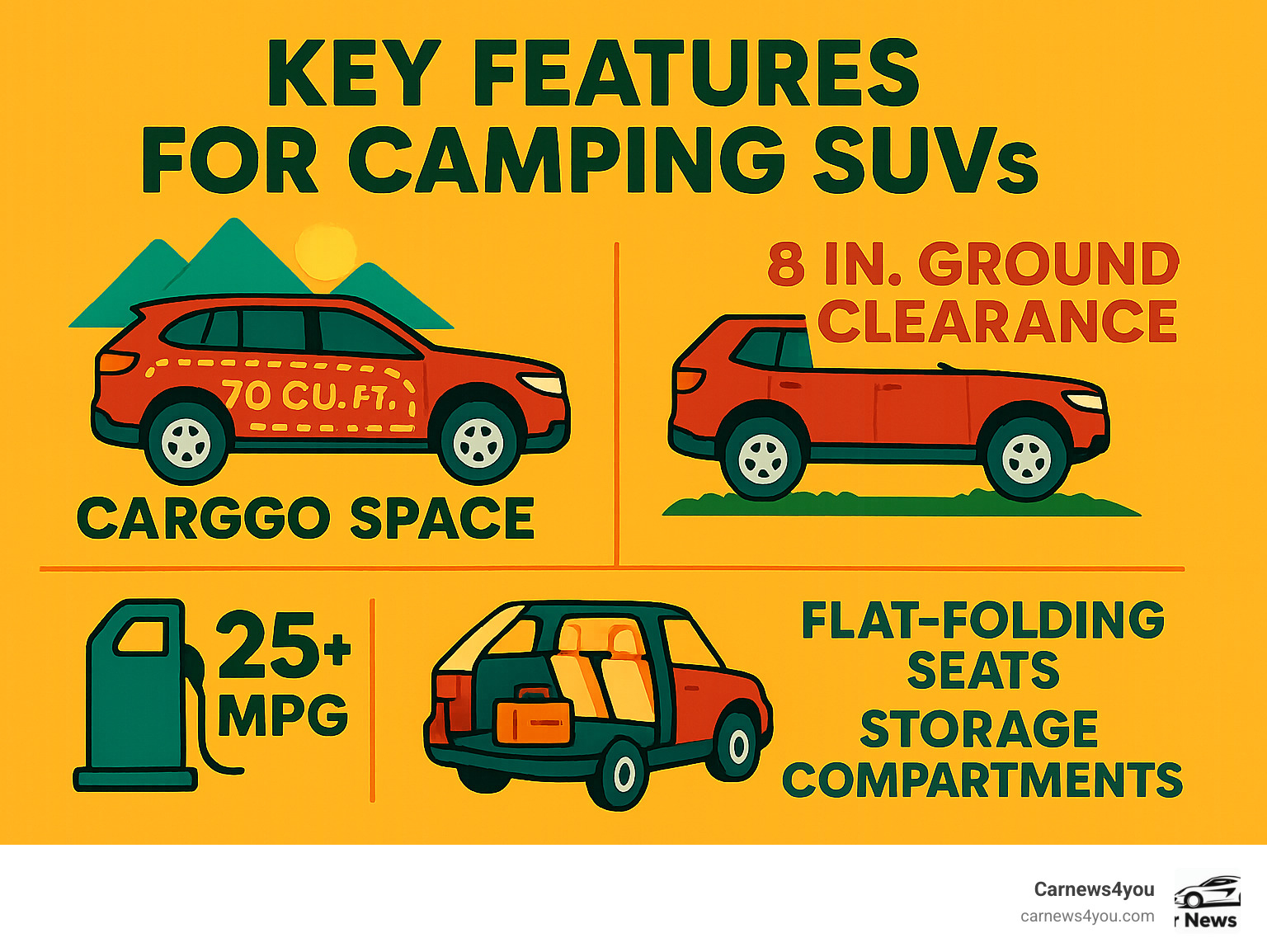
What Makes a Small SUV a Great Mobile Bedroom?
When searching for the best small suv to sleep in, we’re looking for a vehicle that easily converts from a daily driver into a secure and comfortable sleeping space. Specific features are crucial for a successful camping trip.
Cargo space is the most important factor. We need enough usable volume when the rear seats are folded down to create our mobile bedroom. The design is as important as the cubic feet; a flat load floor with minimal wheel well intrusion maximizes the usable sleeping surface. Some SUVs boast large cargo numbers, but if the seats don’t fold truly flat, comfort is compromised.
Beyond space, headroom is key for sitting up and changing clothes without feeling confined. Fuel efficiency is another major benefit. A small SUV’s superior MPG (mid-20s to high-30s for hybrids) means more money for trips and less for gas, a significant advantage over larger, gas-guzzling SUVs. Finally, all-wheel drive (AWD) and good ground clearance are vital for reaching the best secluded campsites, turning a good spot into a great one.
Key Interior Features for Comfort
The interior design can make or break the experience.
- Fold-flat Design: This is non-negotiable. Rear seats must fold completely flat to create an uninterrupted sleeping surface. Some models even have a front passenger seat that folds flat for extra length.
- Cargo Space in Cubic Feet: This measures our potential bedroom. Look for over 55 cubic feet, with top models like the Subaru Forester offering up to 74.2 cubic feet.
- Interior Height (Headroom): Enough vertical space to sit up prevents feeling claustrophobic and helps with air circulation.
- Usable Length for Sleeping: Measure from the rear hatch to the back of the front seats. A length of at least 6 feet (72 inches) is ideal for most adults.
- Storage Nooks: Small compartments and pockets are essential for organizing gear and keeping the sleeping area tidy.
- Panoramic Moonroof: A luxury feature that allows for stargazing from the comfort of your bed.
Essential Performance and Capability Metrics
Performance on and off the road is just as important as interior comfort.
- MPG Ratings: Small SUVs excel here. Hybrids like the Honda CR-V and Toyota RAV4 can exceed 38 MPG, making long trips economical. This allows for more travel on the same budget compared to larger vehicles.
- AWD vs. FWD for Campsites: While FWD is fine for paved roads, AWD is crucial for unpaved forest service roads, mud, or snow. It provides the confidence to access remote camping spots. Many models, like Subarus, offer standard AWD.
- Importance of Ground Clearance: A clearance of 7-9 inches helps steer uneven terrain and protects the vehicle’s underbody. The Subaru Crosstrek has 8.7 inches, while the Outback Wilderness has 9.5 inches.
- Towing Capacity for Small Trailers: Many small SUVs can tow 1,500-3,500 pounds, enough for a small teardrop trailer or extra gear, adding versatility to your setup.
The Best Small SUV to Sleep In: Our Top Picks
Choosing the best small suv to sleep in is a personal journey, but these models offer an excellent balance of space, capability, and camping-friendly features.
| Model | Max Cargo Space (cu. ft.) | Fuel Economy (Combined MPG) | Key Sleeping Feature |
|---|---|---|---|
| Subaru Forester | 74.2 | 29 | Boxy shape, flat-folding rear seats |
| Honda CR-V | 76.5 | 30 (38 Hybrid) | Ample length, 2017+ models fold flat |
| Toyota RAV4 | 69.8 | 30 (39 Hybrid) | Durable, flexible, available hybrid |
| Subaru Crosstrek | 55.3 | 29 | Compact, high ground clearance, standard AWD |
| Mazda CX-50 | 56.3 | 27 | Premium interior, comfortable ride |
| Honda Element (Used) | 74.6 | 23 | Removable seats, waterproof floor, boxy |
Subaru Forester: The Practical Tripper
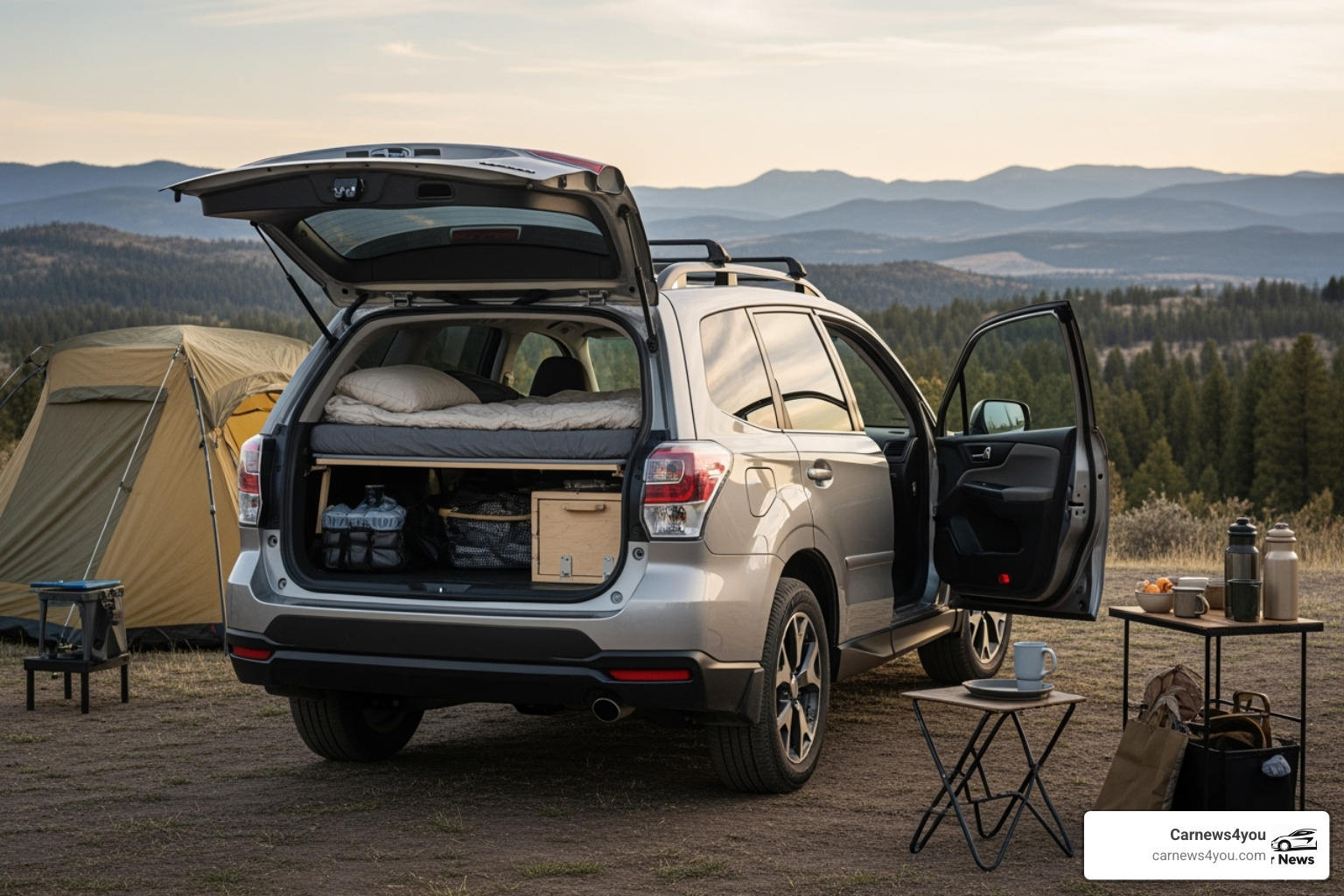
The Forester is a top contender due to its blend of space, capability, and reliability. With 74.2 cubic feet of cargo space, its boxy design maximizes usable volume and headroom. The rear seats fold nearly flat, creating a comfortable sleeping area. Standard Symmetrical All-Wheel Drive and 8.7 inches of ground clearance provide confidence on unpaved roads. Its upright shape gives it an open, airy feel inside, making it a practical and dependable choice for car camping. Learn more at More on the Subaru Forester.
Honda CR-V: The Reliable and Roomy Choice
The CR-V is a favorite for its practicality and spacious interior. Models from 2017 onward feature rear seats that fold completely flat, creating an ideal sleeping surface. With up to 76.5 cubic feet of cargo space and excellent fuel economy (especially the 38 MPG hybrid), it’s an economical choice for long trips. While not as rugged as a Subaru, its on-road comfort and interior volume make it a top pick. For more ideas, see our guide on the Best Compact SUV for Road Trips.
Toyota RAV4: The Versatile All-Rounder
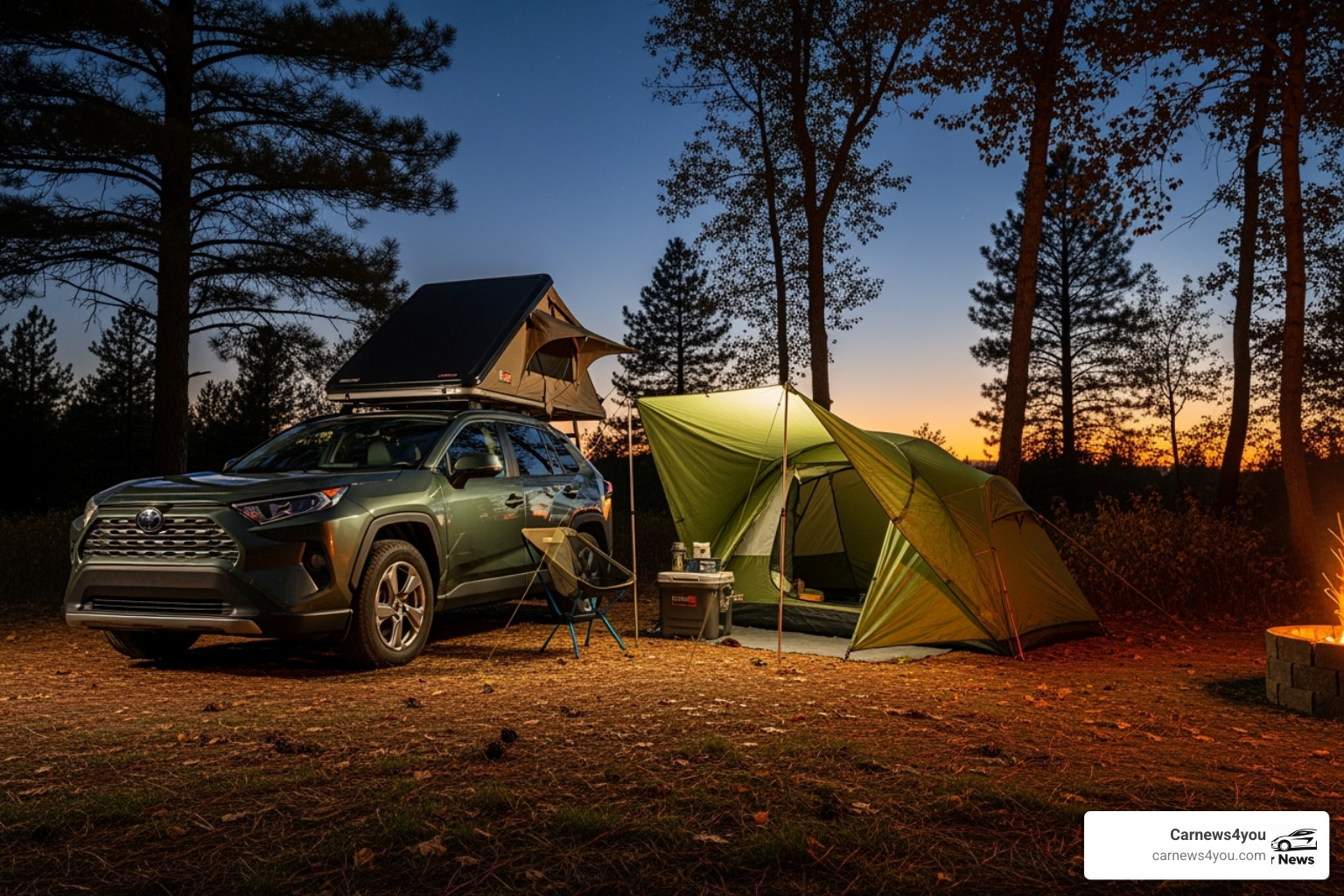
The RAV4 is a versatile, reliable, and capable choice, making it a strong contender for the best small suv to sleep in. It offers up to 69.8 cubic feet of cargo space for sleeping. Its key advantage is the availability of hybrid models with impressive fuel efficiency (around 39 MPG combined). The TRD Off-Road trim adds capability with 8.6 inches of ground clearance. Toyota’s legendary durability makes it a trustworthy partner for Camping in an SUV.
Subaru Crosstrek: The Compact and Capable Pick for the best small suv to sleep in
For those seeking a compact option, the Crosstrek is an excellent choice. Its 55.3 cubic feet of cargo space is sufficient for a solo camper or a cozy couple. What it lacks in volume, it makes up for in capability, with standard Symmetrical All-Wheel Drive and an impressive 8.7 inches of ground clearance. This makes it great for accessing remote campsites. The Crosstrek is also fuel-efficient and budget-friendly. Learn more at Why the Crosstrek is a top pick.
Mazda CX-50: The Stylish and Rugged Newcomer
The CX-50 blends style with rugged capability. It offers 56.3 cubic feet of cargo space, a premium interior, and a comfortable ride. Standard i-Activ AWD provides traction when needed, and its rugged appearance fits the outdoor aesthetic. While newer to the scene, it’s a compelling package for those who want a refined driving experience on their way to the campsite, making it a great Best Car for Long Highway Commute.
Honda Element (A Legendary Used Pick): The Ultimate Utility Box for the best small suv to sleep in
No list is complete without the discontinued Honda Element, a legend on the used market. Its design prioritizes utility, with removable rear seats creating a massive 74.6 cubic foot cavern. The waterproof flooring and clamshell tailgate add to its practicality. Its boxy shape provides excellent headroom, making it a highly sought-after, purpose-built vehicle for car campers.
How to Create a Cozy Nest in Your SUV
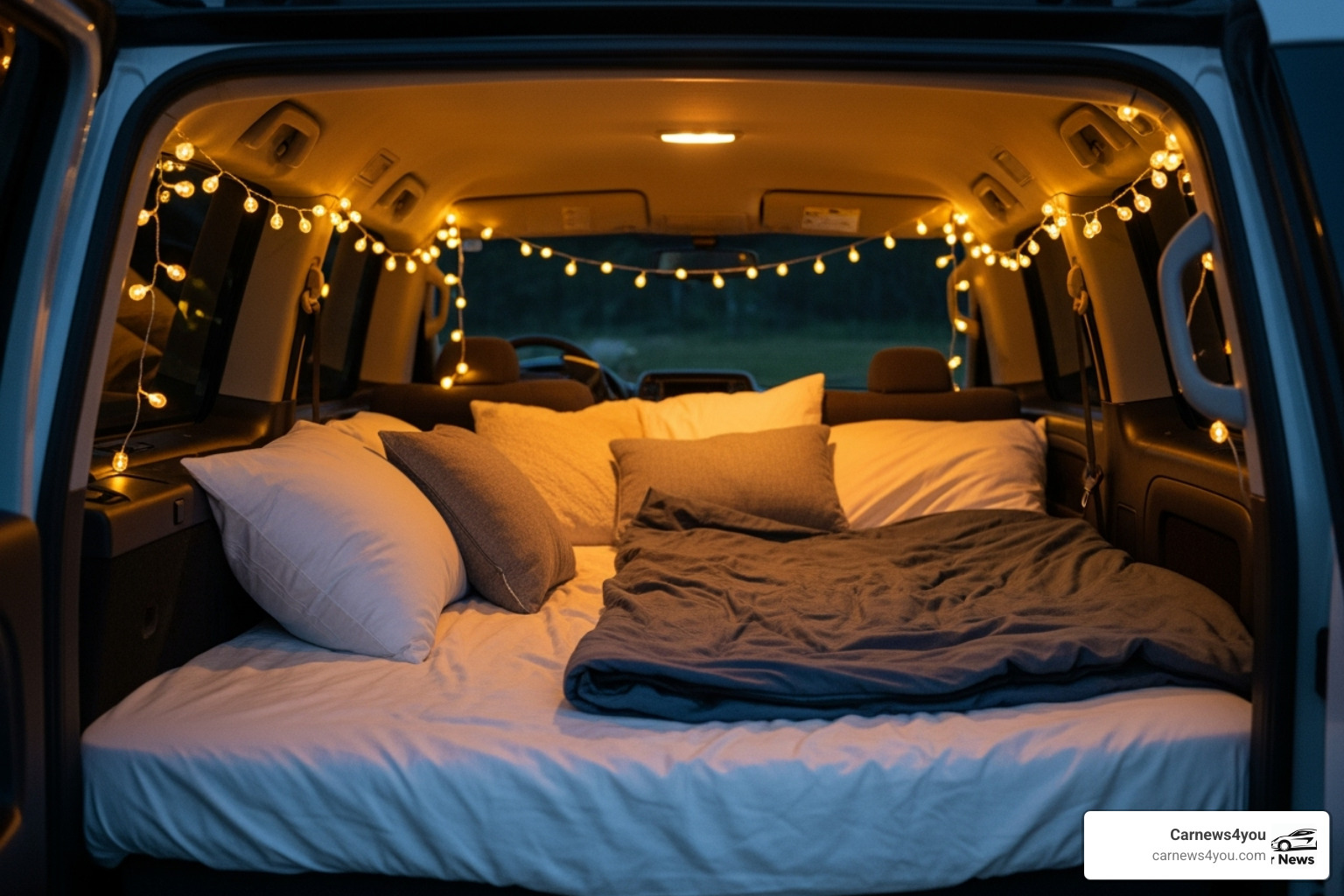
Finding the best small suv to sleep in is the first step. The next is changing it into a cozy sanctuary. With the right accessories, you can create a comfortable and inviting space for a great night’s sleep.
Choosing Your Sleep System
Your sleeping system is the foundation of comfort. Don’t cut corners here.
- Mattresses and Pads: SUV-specific air mattresses like the QDH SUV Air Mattress (72.8 x 51.2 inches) are designed to fit around wheel wells, but can be prone to punctures. Foam pads or folding memory foam mattresses are reliable, durable, and offer excellent insulation. For cold weather, choose a pad with a high R-value (4 or higher) to insulate you from the cold vehicle floor.
- Bedding: Car camping allows for more luxury than backpacking. While a temperature-rated sleeping bag is a safe bet, using a regular comforter, sheets, and your pillow from home can make your setup feel much more like a real bed.
For more detailed setup ideas, check out this A guide to SUV sleeping systems.
Tips for a Good Night’s Sleep
A few strategies can transform your experience from tolerable to restful.
- Level Your Vehicle: Park on flat ground or use leveling blocks to avoid sliding around all night.
- Ventilation and Bug Protection: Crack windows an inch or two to prevent condensation. Use magnetic screens or window socks to keep bugs out.
- Privacy and Light Control: Use window covers (like custom-cut Reflectix) to block light and provide privacy. They also help regulate temperature.
- Power and Comfort: A portable power station lets you charge devices or run a small fan without draining your car battery. A battery-powered fan is a lifesaver on warm nights.
- Organization: Use rooftop cargo boxes, seat-back organizers, or storage bins to keep your sleeping area clear and uncluttered.
Essential accessories include: an SUV mattress or pad, window covers, a battery-powered fan, a portable power station, bug nets, leveling blocks, a cooler, a headlamp, and a carbon monoxide detector (if you ever run the engine for heat).
Frequently Asked Questions about SUV Camping
Here are answers to the most common questions about choosing and using a small SUV for camping.
Is AWD or 4WD necessary for sleeping in a small SUV?
No, it’s not necessary for sleeping, but it’s highly recommended for getting to the best camping spots. If you plan to stick to paved roads and established campgrounds, front-wheel drive (FWD) is perfectly adequate and more fuel-efficient. However, the best small suv to sleep in often needs to access remote areas.
AWD provides the necessary traction for unpaved forest service roads, muddy tracks, or unexpected weather. It gives you the freedom and confidence to reach the secluded, scenic campsites that FWD vehicles can’t. Models like the Subaru Forester or Crosstrek come with standard AWD, offering a great blend of capability and efficiency. For more on this, see our Best Camping SUV guide.
What are the pros and cons of using a small SUV for camping?
Choosing a small SUV involves trade-offs. Understanding them helps you decide if it’s the right fit for you.
Pros:
- Fuel Efficiency: Excellent MPG (25-38) saves money on long trips.
- Versatility: It serves as both your daily driver and your camping rig.
- Maneuverability: Easy to drive and park in tight spaces.
- Stealth: Blends in better than a van or RV for low-profile camping.
- Security: Hard-sided protection from weather and wildlife.
Cons:
- Limited Space: Can feel cramped, especially for more than two people. Organization is key.
- No Standing Room: You can’t stand up to change clothes.
- Condensation: Requires cracking windows for ventilation to manage moisture buildup.
- Setup/Teardown: Requires moving gear to switch between driving and sleeping modes.
Can a tall person (over 6 feet) comfortably sleep in a small SUV?
Yes, but it requires some planning. Most small SUVs offer about 6 to 6.5 feet of linear sleeping space. For taller individuals, here are some tips:
- Sleep Diagonally: This is the most effective trick, often gaining you several extra inches of length. It works best for solo campers.
- Measure First: Before buying, bring a tape measure to the dealership. Fold the seats down and measure the actual usable length.
- Check the Front Seat: Some models have a front passenger seat that folds flat, significantly extending the sleeping platform. This can be a deal-breaker for tall campers.
While you might not stretch out completely, many tall campers find the trade-off worth it for the freedom to wake up in beautiful locations. A 6’4″ person can often make a Subaru Forester work with the right strategy.
Your Next Trip Awaits
Finding the best small suv to sleep in is about finding your perfect trip partner—a vehicle that balances daily life with weekend wanderlust. We’ve seen how models like the spacious Subaru Forester, reliable Honda CR-V, and versatile Toyota RAV4 each offer a unique gateway to the great outdoors.
Whether you prefer the nimble capability of the Subaru Crosstrek, the refined comfort of the Mazda CX-50, or the pure utility of a used Honda Element, the right choice is deeply personal. The perfect vehicle isn’t a single model, but the one that best fits your priorities, whether that’s fuel economy for cross-country treks, AWD for reaching hidden gems, or the most comfortable sleeping platform for a restful night under the stars.
The beauty of car camping in a small SUV is its dual purpose. You’re not just buying a camping rig; you’re choosing a versatile vehicle that serves you every day and transforms into your ticket to freedom on the weekends.
We hope our insights at Carnews4you have helped you on your journey. The research is done, and the open road is calling. Your next great memory is just a vehicle choice away.
Ready to explore even more options? Find the Best Cars for Camping and begin your journey today!

